北师大版必修四Unit10_Lesson1_A_Material_World课件
M4 U10 L1 A Material World教学设计
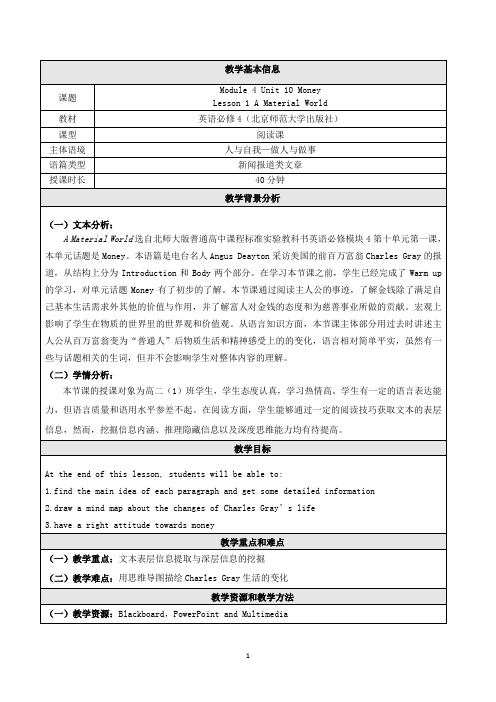
(一)教学重点:文本表层信息提取与深层信息的挖掘
(二)教学难点:用思维导图描绘Charles Gray生活的变化
教学资源和教学方法
(一)教学资源:Blackboard,PowerPoint and Multimedia
(二)教学方法:问题启发式、合作讨论式
教学过程
教学步骤
时间分配和活动方式
教学基本信息
课题
Module 4 Unit 10 Money
Lesson 1 A Material World
教材
英语必修4(北京师范大学出版社)
课型
阅读课
主体语境
人与自我—做人与做事
语篇类型
新闻报道类文章
授课时长
40分钟
教学背景分析
(一)文本分析:
A Material World选自北师大版普通高中课程标准实验教科书英语必修模块4第十单元第一课,本单元话题是Money。本语篇是电台名人Angus Deayton采访美国的前百万富翁Charles Gray的报道,从结构上分为Introduction和Body两个部分。在学习本节课之前,学生已经完成了Warm up的学习,对单元话题Money有了初步的了解。本节课通过阅读主人公的事迹,了解金钱除了满足自己基本生活需求外其他的价值与作用,并了解富人对金钱的态度和为慈善事业所做的贡献。宏观上影响了学生在物质的世界里的世界观和价值观。从语言知识方面,本节课主体部分用过去时讲述主人公从百万富翁变为“普通人”后物质生活和精神感受上的的变化,语言相对简单平实,虽然有一些与话题相关的生词,但并不会影响学生对整体内容的理解。
学习能力:
自主学习
文化意识:
了解百万富翁Charles Gray做慈善的事迹,形成正确的价值观
北师大版英语必修四unit10 lesson1 A Material World 课件 (共18张PPT)

Some questions
What
was charles’ life like in the
past? How about his life now? Why didn’t charles want to be a rich man? How did he deal with his money?
• Retell the text,try to fill in the blanks with the words or phrases in the text.
summary of the passage
• Charles Gray used to be a millionaire. 16 years ago, he was aware that there were many hungry people in the world. He was tired of being a person who had everything in a world where many people had nothing. He decided to drop out. He gave away all his money to charities and to local people like Father Christmas. Then he felt free and happy with little money. He would never go back to being rich.
Unit10 money
Lesson one A Material World
Teaching Aims
1.
To learn some words and phrases 2. To practise reading skills 3. To Master some language points
北师大版高中英语必修4Unit10课件Lesson 1 A Material World 1课件
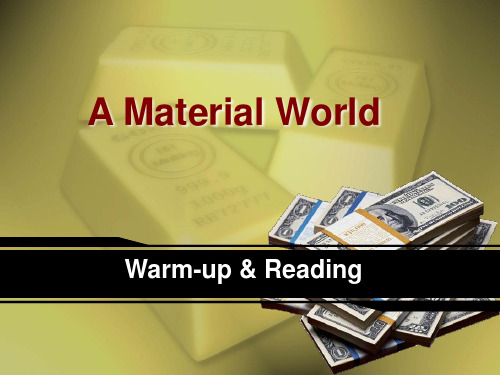
Vocabulary
6. The students _a_r_e_d_e_t_e_r_m_i_n_e_d__to_ make greater progress next term.
had ...
Extension
Voice your opinion: How do you understand the sayings about money? • Money talks. • Money is not everything. • Money doesn’t grow on trees.
Extension Group discussion
What is more important than money?
$
Homework
1. Read the text and memorize the new words.
2. Recite paragraph 1.
world. He decided to _d_r_o_p_o_u__t and discovered that having only a little money _m_a_k_e_s__y_o_u__fr_e_e_.
Read to learn
d 1. to give away c 2. to drop out b 3. to give up a 4.to go back
7. He has always been kind to me. I can’t just _t_u_rn__m__y_b_a_c_k__o_n_him when he is in trouble.
高中英语北师大版必修4课件:Unit 10 Lesson 1 A Material World
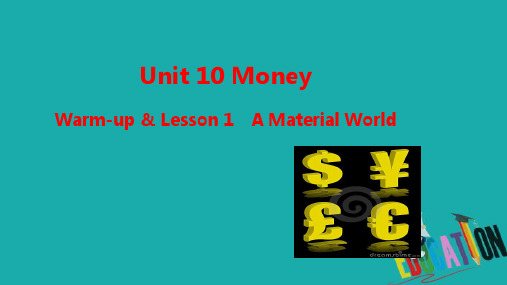
halfway. Just when I was wondering what to do,a kind man gave me a hand,so I was (13)
里面”,引申为“失去,没有”,out of work 便是此意。再如下列短语:
out of trouble 摆脱困境
out of order 出故障;有毛病
out of reach 够不到
out of patience 失去耐心 out of touch 失去联系
out of danger 脱离危险
stopping the train in time before it ran into the mudslide.
词汇二 out of work 失业
◆教材原句
ห้องสมุดไป่ตู้
I’ve been out of work for five years now. 现在我已经失业五年了。
◆要点必记
out of 是一个复合介词,of 之前加了副词out,赋予了它新的合成意义。它的本 义是“不在……
B. there is some new furniture in Charles’ house
〇C. there is a small garden with a few fruit trees outside Charles’s house
D. Charles gets some cheap clothes and shoes from the stores
北师大高一英语模块四Unit 10 Lesson 1 A Material World课文阅读与理解

高一英语必修四Unit 10 Money Lesson1 A Material World同步导学案课文阅读重点句子分析同步导学案编写时间2014-03-20班级___________姓名__________重点句型(自主学习及展示)1. But do all millionaires find the happiness that they thought they would get when they achieve their goals?_____________________________________________________________________本句是一个具有疑问句形式的复合句。
还原为陈述句时,结构如下:主语____________+ 谓语________+ 宾语_________+ [____________从句that (插入语______________) they would get ]+ (状语从句________________________________________)。
[温馨提示]遇到一般疑问句、感叹句、强调句及倒装句时,我们可以先将其还原成陈述句,这样便于看清楚句子结构2. Then they are hardworking to make sure they never lose it!_____________________________________________________________________to make sure they never lose it是不定式短语作_______________________。
动词不定式作状语的用法小结:1)目的状语to…,only to (仅仅为了),in order to,so as to,so (such)…as to…(如此……以便……)___________________________________________他飞快地跑以便赶上第一班车。
北师大版高中英语必修4教案Unit10 1 A Material World
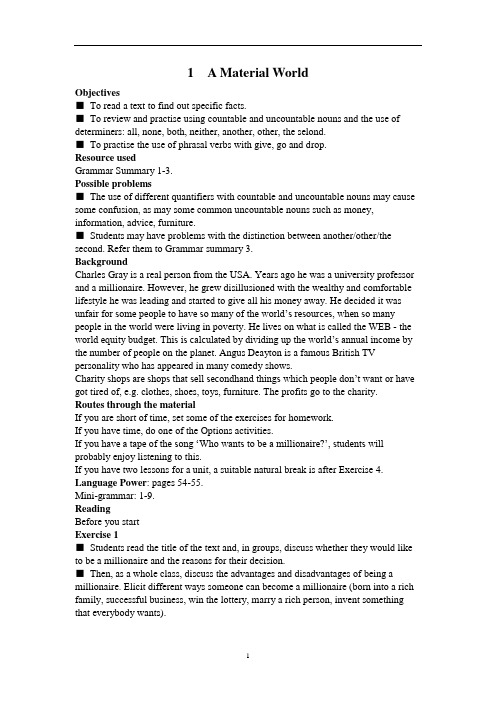
1 A Material WorldObjectives■To read a text to find out specific facts.■To review and practise using countable and uncountable nouns and the use of determiners: all, none, both, neither, another, other, the selond.■To practise the use of phrasal verbs with give, go and drop.Resource usedGrammar Summary 1-3.Possible problems■The use of different quantifiers with countable and uncountable nouns may cause some confusion, as may some common uncountable nouns such as money, information, advice, furniture.■Students may have problems with the distinction between another/other/the second. Refer them to Grammar summary 3.BackgroundCharles Gray is a real person from the USA. Years ago he was a university professor and a millionaire. However, he grew disillusioned with the wealthy and comfortable lifestyle he was leading and started to give all his money away. He decided it was unfair for some people to have so many of the world’s resources, when so many people in the world were living in poverty. He lives on what is called the WEB - the world equity budget. This is calculated by dividing up the world’s annual income by the number of people on the planet. Angus Deayton is a famous British TV personality who has appeared in many comedy shows.Charity shops are shops that sell secondhand things which people don’t want or have got tired of, e.g. clothes, shoes, toys, furniture. The profits go to the charity. Routes through the materialIf you are short of time, set some of the exercises for homework.If you have time, do one of the Options activities.If you have a tape of the song ‘Who wants to be a millionaire?’, students will probably enjoy listening to this.If you have two lessons for a unit, a suitable natural break is after Exercise 4. Language Power: pages 54-55.Mini-grammar: 1-9.ReadingBefore you startExercise 1■Students read the title of the text and, in groups, discuss whether they would like to be a millionaire and the reasons for their decision.■Then, as a whole class, discuss the advantages and disadvantages of being a millionaire. Elicit different ways someone can become a millionaire (born into a rich family, successful business, win the lottery, marry a rich person, invent something that everybody wants).■Ask students to tell the class about any millionaires they know about or people who have suddenly become rich.Read to learnExercise 2Useful vocabulary: charity shops, drop out.■Students should be able to guess the meaning of the words from the text.■Students read the text and answer the questions. They can check their answers with their partners before checking answers as a class. When checking answers, ask students to read out the part of the text that gives the answer for the True statements and to correct the False statements.Answers1 F2 NI3 T4 T5 NI6 F■Students cover the text. Ask them what else they remember and to pool their ideas.Exercise 3■Students refer to the text and match the verbs with their meanings.■After checking answers, ask students to use the verbs in sentences of their own. Answers1 d2 c3 b4 aLanguage Powe r: the Word Corner on page 55 practisesvocabulary from the text.Exercise 4■Students discuss the questions in groups.■Stimulate students to pool the answers to the second question and give reasons. Language StudySOME/ANY/NO; A LOT OF/MANY/MUCHExercise 5■Students complete the interview in pairs.■Ask a pair of students to read the interview to check answers.■Draw students’ attention to the meaning of the sentences, apart from the fact that some are used for countable or uncountable words, and in positive, negative sentences or questions.■In pairs, students talk about themselves on things they have got or things they haven’t got, for example, school bags, CD players, etc.Answers1 many2 many3 a few4 any5 some6 some7 much 8 noALL/NONE; BOTH/NEITHERExercise 6■Advise students to read the whole text first before filling in the gaps.■Check answers by having students read the text aloud.Answers1 all2 none3 Both4 neither5 All6 none■In pairs, students talk about themselves and their attitudes to money, using some of the sentence patterns from the text, e.g. ‘I’m very careful with money …’ ANOTHER, OTHER, THE OTHER,THE SECONDExercise 7■Students can compare their answers with a partner before checking answers as a class.Answers1 other2 another3 the other4 another5 the second6 other7 another8 the other■Check students’ understanding by asking questions, e.g.1 January is the first month of the year. Name the second. Name another month.2 Put one hand up. Now put the other up./Look to the right.Now look the other way.Language in UseExercise 8■Students work in pairs and make sentences using vocabulary in both boxes.■Ask students if they have moved home. If yes, ask them to describe what their new home looks like and then compare their new home to the previous one. If not, ask them to imagine what kind of new home they would like to have.OptionsPracticeIn pairs, students look back at the text in Exercise 2 and write the questions that Angus Deayton asked Charles Gray. Then in groups, the pairs take turns to ask and answer their questions and see if they get all the information in their answers. ExtensionStudents discuss the concept of ‘dropping out’ (e.g. dropping out of college, dropping out of society) What sort of people drop out? Why? What are theadvantages/disadvantages if you drop out? What do students think of people who drop out?。
【公开课教案】北师大必修四Unit 10 Money Lesson 1 A Material World

Unit 10MoneyA Material World一、教学目标1.Summarize the main idea of each paragraph and get some detailed infor mation of the text through reading.2.Do a role play based on the text.二、重点难点Teaching important point:Summarize the main idea of each paragraph and get some detailed information of the text through reading.Teaching difficult point:Do a role play based on the text.三、教学过程StepⅠ.Warm—upWould you like to be a millionaire? Why or why not?StepⅡ.Fast-readingRead and match the main idea of each paragraphParagraph 1: A.the reason why he changed his life Paragraph 2: B.Others don't want to be a millionaire Paragraph 3: C.enjoying the change of his life Paragraph 4: D.some are determined to be a millionaireParagraph 5: E.donating his money Paragraph 6: F.living condition: in the past and StepⅢ.Detailed-readingRead para.1&2 and answer the questions.1) What are a lot of people determined to do about money?2) What are some millionaires determined to do?3) What’s Charles’ attitude towards his money?StepⅣ.Detailed-readingRead para.3 and find out the change of Charles’ life Charles’ lifeSixteen years ago:1.He was a ______ _______who had____ __________dollars.2.He lived in a________six-bedroom house.Today:1.He lives in a__________dormitory room.2.He has only _________________furniture.3.He grows a few fruit trees, vegetables and flowers in a_________garden.4.He gets his clothes and___________thingsfrom____________________ .StepⅤ.Detailed-readingRead para.4-6 and answer the questions1. How did Charles Gray feel about the change of his life? And Why?2. How did Charles Gray deal with his money?3. Why did he give away all his money, none left?The reasons:1)He______ _______ _______being a person who had everything in a w orld where many people had nothing.2)He said_______ _______all his money brought him___________ .3)He_____ _______there were lots of hungry people in the world.4)He thought having only a little money made him___________StepⅥ.Post-readingRole play: Have an interview of the ex-millionaire Charles Gray. You can follow the example below.Student A: Angus Deayton.Student B: Charles Gray.ExampleSA: Hi, Mr. Gray! We've know that you were a millionaire, so what did you do and what was your life like in the past?SB: I was a college professor and I had ...SA: And how about your life now?SB:SA: OK. How do you feel about this change? Why didn’t you want to be a rich man?SB:SA: How did you deal with your money?SB:SA:You are so kind, merciful and generous. And how do you feel now? SB:SA: Ok, Mr. Gray, thank you again for your attending this interview. StepⅦ.SummaryIn this text, we got familiar with the famous ex-millionaire-Charles Gray. He gave away all his money to poor people. He is pleased to live an ordinary life. He is very generous and kind. From Charles Gray, we know that having lots of money doesn’t mean yo u are happy. We should have a good heart. Money is not everything. So we must have a positive attitude towards money.StepⅧ.HomeworkWrite a composition whose topic is whether money is everything.。
北师大版高中英语必修四Unit 10《Lesson 1 A Material World》教案 3

Unit 10 MONEYLesson1 A Material World教学设计I .Teaching aims:1. To practice reading skills.(训练阅读技巧)2. To read a text to find out specific facts.(读课文找信息)3. To practise the use of phrasal verbs with give, go and drop.(学会运用词组)4. To learn different lifestyles of some millionaires.(了解百万富翁的生活方式)5. To learn western people’s attitude towards money.(了解西方国家对金钱的看法)6. To lead students to build up correct attitude towards money.(引导学生树立正确的金钱观)II. Teaching stresses:Understand the text.Use the information from the text to finish some exercises.Learn to use phrasal verbs.Help students build up correct attitude towards money.III. Teaching difficulties:To use phrasal verbs correctly.Help students build up correct attitude towards money.III. Teaching methods:Task-based teaching(任务型教学法)Communication teaching(交际型教学法)IV. Teaching aids: MultimediaV. Teaching procedures:Step 1 Warm-up(导入——展示Bill Gates和姚明的图片)Show pictures of two millionaires: Bill Gates,Yao MingQuestions:Would you like to be a millionaire? Why or why not?Do you know any millionaires? Do you think they are happy?What can money buy? What can’t money buy?Step 2 Reading comprehension:(阅读理解)Task 1: fast reading(快速阅读)Read the text quickly and finish exercise 2, T/F/NITask 2: detailed reading(细读)Read the text again and choose the best answer according to the text.1. A lot of people want to be a millionaire, but when they achieve this goal, ________________.A. it's not certain that they find the happiness they thought.B. all of them continue to be concerned about money.C. they won't be hardworking.D. all of them turn their backs on their millions.2. Now, Charles Gray is _____________.A. a businessman who owns $ 2 million.B. a professor with $ 2 million.C. not a millionaire any longer, but he gets more happiness than before.D. a rich man who lives in a six-bedroom house3. The phrase "turned their backs on" in paragraph 2 means ___________________ according to the context.A. refusedB. turned aroundC. turned backD. confused4. Why did Charles Gray give up the lifestyle of a rich man?A. He was afraid of his money being stolen.B. He was crazy.C. He didn't want to be hardworking to make sure he never lost his money.D. He was tired of being a person who had everything in a world where many people had nothing.5. Which one is NOT true in the following sentences?A. Today Charles lives in a small dormitory room.B. When Charles had two thousand dollars left, he gave away small bank notes in the streets of local poor areas.C. Charles was happier when he was rich.D. Charles grows some vegetables and a few flowers.Task 3: Find out the phrases from the text and match them with the correct meanings(找出词组并完成相关词组练习)Be determined to do give sb. sthAchieve their goals leave a lifestyleBe concerned about be worried aboutTurn one's back on to decideBe tired of get what they wantGive away have enough of sthDrop out pay no attentionImportant phrases:1.be determined to决心…2.dream up虚构出3.make sure确定,证实4.turn one’s back on不理睬5.give up放弃6.be tired of厌烦7.give away赠送,分发8.drop out不参与,离去,放弃Practice: use the correct form of the phrases to finish the sentences.be determined to, dream up, make sure, give away,turn one’s back on, give up, be tired of, drop out1. He __________all his money to charities.2. They __________ a plan to control the market.3. I only came to __________that everything was all right.4. She _________________ her family when they needed help.5. Ten runners started, but three soon ________.6. Many students __________ doing homework.7. __________ smoking is good for your health.8. I ________________ go to university.Task 4: Ex-millionaire Charles Gray16 years ago:He ____ a college professor. He ____a huge six-bedroom house and $2 million.Today:He in a small dormitory room with___________ furniture. He with a few fruit trees. He _____ some vegetables and a few flowers. He ____ clothes and other things from charity shops.His attitude to the change:He it. He to the lifestyle of a rich man. He being a person who had in a world where people had . He made the choice to all his money to charities. He was that there were hungry people in the world. He decided to and discovered that having only a little money ___you ___. He’s much _______ now. He wouldn’t __ ___ __being rich for anything - __ ___!Step 3 Interview(采访——对本文主人公)Imagine you are Charles and you are having an interview with a reporter.Example:Angus: Hello, Charles! You look great.Charles: Yes, that's true.Angus: 16 years ago, you were a millionaire. What did you have at that time?Charles: I had …Angus: W hy did you give up…?Step 4 Summary.(总结)Although different millionaires have different lifestyles, they all should do something meaningful to the society.Step 5 Homework.(作业)1. Memorize the new words and read the text.2. Do you think money makes you happy? Are there any important things in life? Please write down your opinion.Writing:If I had one million, I would...如果我有一百万,我会……。
北师大版高中英语必修四Unit 10《Lesson 1 A Material World》教案 1

Unit 10 MONEYLesson 1 A Material World教学设计Objectives:1. Train the students’ reading ability by fast reading and careful reading.2. Do some listening practice to improve the students’ listening ability.3. Help the students develop a good attitude towards money.Important Points:Help the students understand the reading materials.Difficult Points:How to improve the students’ reading ability.Teaching Methods:1. Fast reading and careful reading.2. Pair work or individual work.Teaching Procedure:Step Ⅰ Pre-readingLead-in:Show the students some pictures about varieties of inviting food, beautiful clothes, sports cars and travelling, and then ask them the following questions:1. Do you want to eat inviting food, wear beautiful clothes, drive sports cars and travel around the world?2. What do you need to do these things? (Large quantities of money)3. Do you want to be a millionaire?Time is money. In order to do all the things above, you must cherish your time and work hard to enrich your knowledge and improve your abilities. Take action now.New Words and Phrases:determine enjoyable second-hand concern dormitory pleased awaredrop out businessman stove drunk journalist give awayStep ⅡFast-readingSkim the text to get the main ideas and choose the best answer. (Competition begins)1. Which of the following is true about Charles Gray?He is a college professor.He used to be a millionaire.He is a farmer.He is a rich businessman.2. Why didn’t Charles want to be a rich man?A. Because he was fed up with the lifestyle of a rich man.B. Because he was kidnapped(绑架) for several times.C. Because there are so many poor people in the world.D. Because there is no privacy(隐私)for the rich at all.3. How did Charles deal with his huge amount of money?A. He gave it away to charities.B. He gave it away to local people.C. He gave it away to hungry people in the world.D. He kept it in the bank.4. Charles is an example to show____?A. that people can be happy without money.B. that a rich man can find happiness by giving his wealth away to charities.C. some millionaires will continue to be concerned about money after they become millionaires.5. How does Charles think about his present life?Tired and worried.B. Funny but enjoyableC. Free and happy.Keys: B A A A CStep ⅢCareful-readingRead the text carefully and get as much detailed information as you can. (Competition goes on) Task One: True, False or No Information?1. Charles Gray was a rich businessman.2. He hasn’t got a stove in his dormitory.3. He has got a vegetable garden.4. Charles gave his money away to poor people.5. People thought he was drunk when he gave away small bank notes in the street.6. He was happier when he was rich.Keys: F NI T T NI FTask Two: Complete the table.Step ⅣVoice your opinion.What’s your attitude towards money?Step ⅤEmotional educationMoney can buy a house, but can't buy home;Money can buy a clock, but can't buy time;Money can buy a bed, but can't buy sleep;Money can buy a rose, but can't buy love;Money can buy a book, but can't buy knowledge;Money can buy medicine, but can't buy health;Money can buy status, but can't buy respect;Step ⅥHomework:1. Write a short passage according to what we discussed.2. Preview the language points in the text.。
北师大课标版高中英语必修4Unit 10Lesson1(共22张PPT)
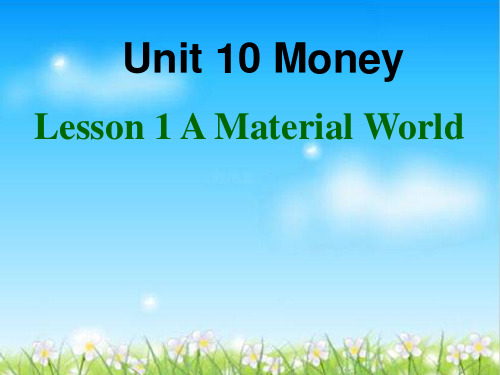
Read the article to know something about Charles Gray. Decide if the statements below are true (T), false (F) or there is no information (NI).
1. Charles Gray was a rich businessman. 2. He hasn’t got a stove in his dormitory. 3. He has got a vegetable garden.
Villa
Jewelry
expensive car
famous brand
Money talks. 金钱万能 Money makes the mare go. 有钱能使鬼推磨。
Is money everything? Do you think so?
Who wants to be a Millionaire?
Student A: Angus Deayton. Student B: Charles Gray.
Example SA: What was your and what did
you have 16 years ago? SB: I was a college professor and I
Money ≠ Happiness
Spiritual life
_L_e_s_s__ happiness
_M_o__re_ happiness
The past
﹖
_M_o__re__ money
_L_e_s_s_ money
The present
Material life
北师大课标版高中英语必修4Unit 10Lesson1(共19张PPT)

Teaching Procedues
1. Vocabulary 2. Lead-in 3. Fast-reading 4. Careful-reading 5. Post-reading 6. Homework
明朝未及,我只有过好每一个今天,唯一的今天。
昨日的明天是今天。明天的昨日是今天。为什么要计较于过去呢(先别急着纠正我的错误,你确实可以在评判过去中学到许多)。但是我发现有的人过分地瞻前顾后了。为 何不想想“现在”呢?为何不及时行乐呢?如果你的回答是“不”,那么是时候该重新考虑一下了。成功的最大障碍是惧怕失败。这些句子都教育我们:不要惧怕失败。如 果你失败了他不会坐下来说:“靠,我真失败,我放弃。”并且不是一个婴儿会如此做,他们都会反反复复,一次一次地尝试。如果一条路走不通,那就走走其他途径,不 断尝试。惧怕失败仅仅是社会导致的一种品质,没有人生来害怕失败,记住这一点。宁愿做事而犯错,也不要为了不犯错而什么都不做。不一定要等到时机完全成熟才动手。 开头也许艰难,但是随着时间的流逝,你会渐渐熟悉你的事业。世上往往没有完美的时机,所以当你觉得做某事还不是时候,先做起来再说吧。喜欢追梦的人,切记不要被 梦想主宰;善于谋划的人,切记空想达不到目标;拥有实干精神的人,切记选对方向比努力做事重要。太阳不会因为你的失意,明天不再升起;月亮不会因为你的抱怨,今 晚不再降落。蒙住自己的眼睛,不等于世界就漆黑一团;蒙住别人的眼睛,不等于光明就属于自己!鱼搅不浑大海,雾压不倒高山,雷声叫不倒山岗,扇子驱不散大雾。鹿 的脖子再长,总高不过它的脑袋。人的脚指头再长,也长不过他的脚板。人的行动再快也快不过思想!以前认为水不可能倒流,那是还没有找到发明抽水机的方法;现在认 为太阳不可能从西边出来,这是还没住到太阳从西边出来的星球上。这个世界只有想不到的,没有做不到的!不是井里没有水,而是挖的不够深;不是成功来的慢,而是放 弃速度快。得到一件东西需要智慧,放弃一样东西则需要勇气!终而复始,日月是也。死而复生,四时是也。奇正相生,循环无端,涨跌相生,循环无端,涨跌相生,循环 无穷。机遇孕育着挑战,挑战中孕育着机遇,这是千古验证了的定律!种子放在水泥地板上会被晒死,种子放在水里会被淹死,种子放到肥沃的土壤里就生根发芽结果。选
高二英语 Unit10 Lesson1 A Material World课件 北师大版必修4

• True or false or no information
• 1. Charles Gray was a rich
F NI
businessman.
T
• 2. He hasn’t got a TV in his T
caravan.
NI
• 3. He has got a vegetable F
garden.
• 4. Charles gave his money to poor people. • 5. People thought he was crazy when he
gave away small bank notes in the street. • 6. He was happier when he was rich.
– 3. To find out the words with the help of English meaning
• Resources used
• pictures from the Internet, the film A Million Pound Bank-Note
李嘉诚
Bill Gates
Lesson 37 A Material World
• Teaching Objectives
• 1. To practise scanning the text to extract specific information
• 2. To practise intensive reading skills
• Design questions
• 1. What is the ultimate goal for a lot of people?
- 1、下载文档前请自行甄别文档内容的完整性,平台不提供额外的编辑、内容补充、找答案等附加服务。
- 2、"仅部分预览"的文档,不可在线预览部分如存在完整性等问题,可反馈申请退款(可完整预览的文档不适用该条件!)。
- 3、如文档侵犯您的权益,请联系客服反馈,我们会尽快为您处理(人工客服工作时间:9:00-18:30)。
Million Pound Bank-Note
李嘉诚
Bill Gates
Design questions 1. What is the ultimate goal for a lot of people? 2. For some millionaires what they continue to do when they become rich? 3. What’s the living conditions of Charles now? 4. Is Charles satisfied with his present lifestyle?
Hale Waihona Puke Free talk Would you like to be a millionaire? Do you hold the opinion that money makes you happy? Are there more important things in life?
1. to give away a) to return 2. to drop out b) to stop doing something 3. to give up c) to change or leave a lifestyle 4. To go back d) to give someone something you don’t need Answers: 1. d) 2. c) 3. b) 4. a)
True or false or no information 1. Charles Gray was a rich businessman. F 2. He hasn’t got a TV in his caravan. NI 3. He has got a vegetable garden. T 4. Charles gave his money to poor people. T 5. People thought he was crazy when he gave away small bank notes in the street. NI 6. He was happier when he was rich. F
Lesson 37 A Material World
Teaching Objectives 1. To practise scanning the text to extract specific information 2. To practise intensive reading skills 3. To find out the words with the help of English meaning Resources used pictures from the Internet, the film A
